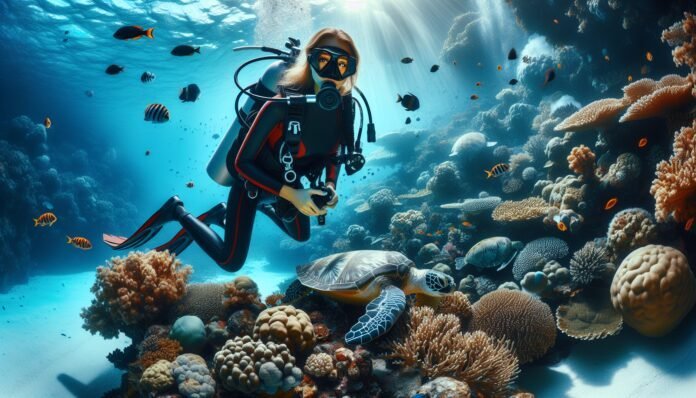beginner’s guide to scuba diving offers everything you need to know to explore the underwater world. Did you know that more than 70% of the Earth’s surface is covered by water? Scuba diving lets you experience this hidden realm, filled with vibrant marine life and breathtaking underwater landscapes. This guide covers essential tips, equipment basics, safety practices, and what to expect during your first dive. If you’re ready to dive into a new adventure, keep reading to make your journey safe and unforgettable.
Introduction to Scuba Diving
Diving into the underwater world opens a door to a realm filled with vibrant marine life and stunning landscapes. Scuba diving offers an experience unlike any other, inviting adventurers to discover the mysteries of the deep. This guide is crafted for beginners eager to embark on this exhilarating journey.
What is Scuba Diving and Why is it Popular?
Scuba diving is an underwater diving activity using self-contained breathing apparatus, allowing divers to explore beneath the ocean’s surface for extended periods. The allure of scuba diving lies in its ability to transport individuals to a serene yet dynamic environment. It’s a favorite recreation due to the unique opportunity it offers to see marine life up close and witness ecosystems in their natural habitat.
Popularity of scuba diving has mushroomed over the years, with millions exploring the depths. Divers often report a sense of tranquility and liberation, unmatched by any surface activity. The sport’s accessibility has improved, making it easier for beginners to join in and appreciate the wonders of the underwater world.
The Benefits of Exploring the Underwater World
Exploring underwater landscapes can be incredibly rewarding. Not only do divers get a close-up view of mesmerizing sea creatures, but the experience also promotes mental well-being. The quiet environment below the waves encourages mindfulness, reducing stress and anxiety.
Physical benefits are also notable. Swimming and diving engage various muscle groups, offering a full-body workout that enhances strength and flexibility. Moreover, diving can improve cardiovascular health by boosting oxygen intake and circulation.
Additionally, scuba diving fosters a deeper appreciation for marine conservation. Witnessing the beauty and fragility of oceanic life firsthand often inspires divers to advocate for protecting these delicate ecosystems.
Myths About Scuba Diving: What Beginners Should Know
Misconceptions about scuba diving often deter potential enthusiasts. One common myth is that diving is dangerous. While risks exist, proper training and adherence to safety protocols mitigate them significantly. Another myth suggests that diving is prohibitively expensive. Although initial investments in gear and courses are required, many find the experience worth the cost.
Some believe that diving is only for strong swimmers. While swimming skills are beneficial, beginner courses accommodate varying abilities, focusing on safety and comfort. Understanding these myths helps beginners approach diving with confidence and enthusiasm.
Essential Scuba Diving Gear for Beginners
Equipping yourself with the right gear is essential for a safe and enjoyable diving experience. This section covers the must-have scuba equipment, how to choose the right gear for your needs, and tips for maintaining your equipment.
Overview of Must-Have Scuba Diving Equipment
Having the right equipment is crucial for a successful dive. Essential gear includes:
- Mask: Provides a clear view underwater.
- Snorkel: Allows breathing at the surface without lifting your head.
- Fins: Aid in efficient swimming.
- Wetsuit or drysuit: Provides thermal protection.
- Regulator: Delivers air from the tank to the diver.
- Buoyancy Control Device (BCD): Helps control your position in the water.
- Tank: Supplies the air needed to breathe underwater.
- Weights: Assist in achieving neutral buoyancy.
How to Choose the Right Diving Gear for Your Needs
Selecting the right gear involves considering factors such as water conditions, personal comfort, and budget. Start with a mask that fits snugly without discomfort. Fins should be flexible and fit well, enhancing propulsion without straining your legs.
When choosing a wetsuit, consider the water temperature. A thicker suit is necessary for colder waters, while tropical environments require lighter protection. Regulator selection should prioritize reliability and ease of breathing. Opt for a BCD that fits comfortably and allows for easy adjustment.
Investing in quality gear is essential, as it ensures longevity and performance. Conduct research and consult with experienced divers or professionals to make informed choices.
Caring for and Maintaining Your Scuba Equipment
Proper maintenance of scuba gear prolongs its life and ensures safety. Rinse all equipment with fresh water after each dive to remove salt and debris. Pay special attention to regulators and BCDs, allowing them to dry thoroughly before storage.
Regularly inspect your gear for wear and tear. Check for cracks in the mask, leaks in the suit, and ensure the regulator operates smoothly. Store gear in a cool, dry place, avoiding direct sunlight and extreme temperatures.
Professional servicing of equipment, especially regulators and tanks, is recommended annually. Such diligence ensures reliability and functionality, providing peace of mind during dives.
Preparing for Your First Scuba Diving Experience
Embarking on your first dive is an exciting milestone. Preparation involves selecting the right certification course, understanding basic safety rules, and knowing what to expect during your debut underwater experience.
Choosing the Best Certification Course for Beginners
Beginner divers should start with an Open Water Diver course, offered by recognized organizations such as PADI or SSI. These courses provide foundational knowledge and skills necessary for safe diving.
Look for courses led by experienced instructors who prioritize safety and offer personalized instruction. Consider factors such as location, class size, and cost. Many courses include classroom sessions, pool training, and open water dives, providing a comprehensive learning experience.
Certification involves both theoretical exams and practical assessments. Completing this course equips you with the skills and confidence to explore the underwater world independently.
Basic Safety Rules and Diving Techniques for New Divers
Safety is paramount in scuba diving. Always dive with a buddy, never alone. Before diving, perform equipment checks to ensure everything is functioning correctly. Familiarize yourself with hand signals for underwater communication.
Practice neutral buoyancy, a technique allowing you to hover effortlessly underwater. It conserves energy and protects the marine environment. Equalize pressure in your ears by pinching your nose and blowing gently, a crucial skill for descending safely.
Monitor your air supply and depth regularly. Ascend slowly to avoid decompression sickness. Following these safety rules ensures a safe and enjoyable diving experience.
What to Expect During Your First Open Water Dive
Your first open water dive is a thrilling experience. Expect to feel a mix of excitement and nervousness. The dive typically begins with a briefing, covering the dive plan and safety protocols.
Initial descent involves acclimating to the underwater environment, adjusting buoyancy, and breathing rhythmically. Instructors often guide the group to explore the dive site’s unique features, such as coral reefs or shipwrecks.
Embrace the surreal sensation of weightlessness and the beauty of marine life surrounding you. Post-dive, a debriefing session allows reflection on the experience and emphasizes areas for improvement.
Enhancing Your Underwater Adventure
As you gain confidence in diving, you’ll want to refine your skills and explore new destinations. Building confidence, discovering top diving locations, and pursuing advanced courses enrich your underwater adventures.
Tips for Building Confidence as a Beginner Diver
Confidence grows with experience and practice. Regular diving helps familiarize you with the underwater environment, enhancing comfort and reducing anxiety. Joining a dive club or community provides opportunities for shared experiences and learning from seasoned divers.
Practice skills learned during certification regularly, such as buoyancy control and mask clearing. Gradually increase dive complexity while staying within your comfort zone. Review dive logs and notes to track progress and identify areas for improvement.
Top Scuba Diving Destinations for Beginners
Beginner divers have access to numerous breathtaking dive sites worldwide. The Great Barrier Reef in Australia offers vibrant coral gardens and abundant marine life, ideal for novice exploration. The Red Sea in Egypt is renowned for clear waters and diverse aquatic species, providing stunning underwater vistas.
In the Caribbean, destinations like Cozumel and Bonaire boast beginner-friendly sites with calm waters and colorful reefs. Thailand’s Similan Islands offer warm water and diverse marine life, making it a popular choice for new divers.
Each destination provides unique experiences, encouraging beginners to appreciate the beauty and biodiversity of marine ecosystems.
Continuing Education: Advanced Courses and Specialties
Diving education doesn’t stop with basic certification. Advanced courses and specialties enhance skills and knowledge, opening new diving opportunities. Courses like Advanced Open Water Diver introduce new challenges, such as deep and night dives.
Specialty courses focus on specific interests, such as underwater photography, wreck diving, or marine conservation. These courses deepen understanding and passion for the underwater world.
Continued education fosters a lifelong love for diving, encouraging exploration and adventure beyond the initial beginner’s guide to scuba diving.
Conclusion
Scuba diving allows individuals to explore underwater ecosystems using specialized equipment like masks, fins, and breathing apparatus. It offers physical and mental health benefits, promotes conservation awareness, and provides a unique sense of tranquility. Beginner divers should focus on proper training, safety techniques, and selecting well-fitting gear for a safe experience. Popular diving destinations like the Great Barrier Reef and the Red Sea cater to novices with clear waters and vibrant marine life. Advanced courses and specialty certifications enhance skills, enabling divers to explore new challenges and deepen their passion for underwater exploration.
FAQ
What is the minimum age and health requirement for scuba diving?
The minimum age for scuba diving is generally 10 years old, although some programs offer experiences for children as young as 8. Good physical health is essential. Prospective divers should be free from conditions like heart problems, severe asthma, or epilepsy. A medical questionnaire usually determines fitness to dive.
How do I choose the best scuba diving equipment for beginners?
Choosing beginner-friendly scuba equipment involves focusing on comfort and ease of use. Start with a mask that fits well and a snorkel. Fins should be comfortable and provide good propulsion. A wetsuit that suits the water temperature is crucial. Consult with a diving instructor or a reputable dive shop for personalized advice.
What is the cost of learning scuba diving as a beginner?
Learning to scuba dive can cost between $300 to $600 for a basic certification course. Prices vary depending on location, included equipment, and additional materials. Sometimes, comprehensive packages offer better value, including dives and necessary gear.
How safe is scuba diving and what certifications are needed?
Scuba diving is safe when conducted with proper training and adherence to safety protocols. Entry-level certification is usually an Open Water Diver certification. Reputable organizations like PADI or SSI offer these courses. Completing them ensures you understand safety procedures and diving techniques.
What are the best beginner-friendly scuba diving destinations?
Top beginner-friendly scuba diving destinations include the Great Barrier Reef in Australia, Cozumel in Mexico, and the Red Sea in Egypt. These locations offer gentle currents, excellent visibility, and abundant marine life, making them ideal for new divers.
How long does it take to get certified for scuba diving?
Receiving scuba diving certification typically takes three to four days. This timeframe covers classroom learning, confined water sessions, and open water dives. Some intensive courses may condense this schedule over a weekend.

